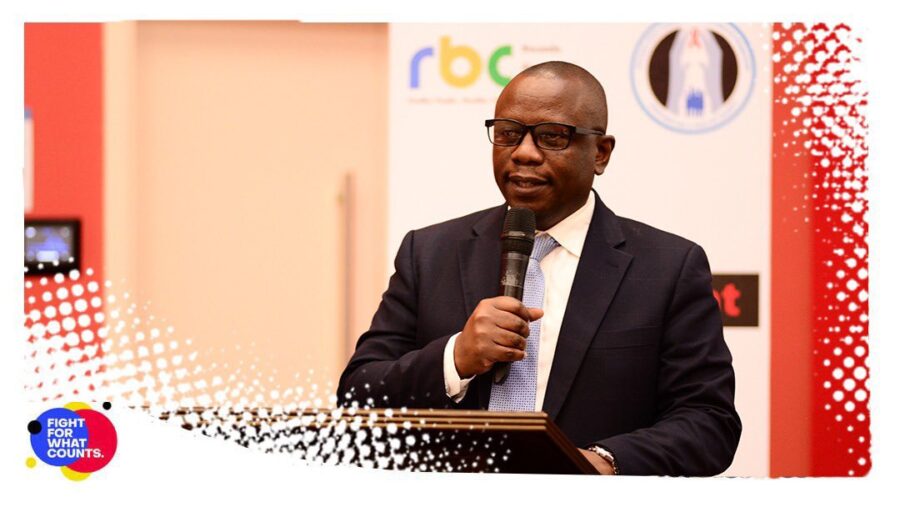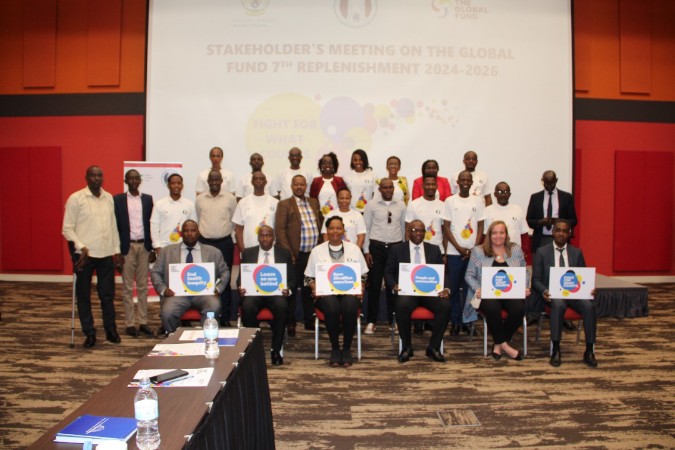Rwanda NGOs Forum makes case for every one’s role for successful Global Fund’s 7th Replenishment

Rwanda NGO Forum on HIV/AIDS and Health Promotion (RNGOF & HP) has urged Rwandans and citizens across the globe in general to contribute to the Global Fund’s 7th replenishment.
The call was made during Stakeholders meeting on the Global Fund seventh Replenishment for 2024-2026, held in Kigali on May 5, 2022.
The meeting was organized by Rwanda NGOs Forum in partnership with Global Fund and Rwanda, CCM.
During its 20 years of operations, Global Fund saved 44 million lives and cut the combined death rates from the three diseases namely HIV, TB and malaria by more than half.
To maintain the progress, the fund which is fighting against the world’s deadliest pandemics is organizing its 7th replenishment which would save 20 million lives during 2024-2026.
The needed funds could cut the death rate from HIV, TB and malaria by 64% and build a healthier, more equitable world.
According to the Global Fund, to stay on track in the fight against those pandemics, build a resilient and sustainable system for health and strengthen global health security, it needs to raise at least US$ 18 billion for the 7th replenishment.
The chairperson of that Forum (RNGOF), Bernard Muramira highlighted the role being played by Rwanda Civil Society Organizations ( CSOs) to advocate for a successful 7 Replenishment of the Global Fund.
“With science, funds and effective global collaboration that puts communities at the center, we can force even the deadliest diseases into retreat,” he said.
He said that to meet the target, there is a need for everyone’s contribution.
“Everyone’s contribution is needed; you and I, and someone else, our dollar, one, two and more are needed to raise the $18 billion needed,” he said.
He added that the Global Fund is using the budget collected through the replenishment to help countries including Rwanda in different programs such as fighting against malaria, providing mosquito nets, treatment of tuberculosis and the provision of antiretroviral drugs to people with HIV/AIDS.
Rwanda pledged US$2.5 million for the Global Fund’s Sixth Replenishment, covering 2020-2022 and gained US$ 190 million from Global fund during that period.
The country is both a donor to the Global Fund and an implementer of Global Fund-supported programs which lauds its support according to Dr Theophile Dushime, the Chief Technical advisor to the minister of health .

Dushime has called upon every Rwandan to support this program.
“Without their support, we would have a serious problem, from access to (expensive) diagnostic equipment, recruitment and payment of some health workers in health centers and hospitals, and purchase of anti-retroviral drugs. On malaria treatment, they help to buy mosquito nets, laboratory equipment and anti-tuberculosis drugs, and even health system strengthening,” he said.
He added, “ With Global Fund support, Rwanda has registered tremendous success through our national programs including the remarkable progress made towards achieving HIV epidemic control, continued reductions in TB incidence and increases in treatment success rates.”
Isabelle Nizeyimana , from Community of Women Living with HIV/AIDS Eastern Africa- Rwanda Chapter, said that Global Fund has saved their lives and called upon every Rwandan to give its support.
“Before the Global Fund starts its interventions in Rwanda, we used to record so many deaths caused by HIV/AIDS. Global fund has saved our lives, and therefore we are urging everyone to value this work, to own it, and to give their support, because if every one contributes at least one coin, the funding will increase to save the lives of many,” she said.

According to Global Fund, Rwanda has been part of Global Fund partnership since 2003.
During this time, significant progress has been made in the fight against HIV, tuberculosis (TB) and malaria in the country with key achievements in the country.
Between 2010 and 2020, the number of AIDS-related deaths decreased by 59%, from approximately 5,900 in 2010 to approximately 2,500 in 2020.
The proportion of people living with HIV receiving antiretroviral drugs more than doubled, from 89,000 in 2010 to 207,000 in 2020.
Between 2010 and 2020, coverage of medication that prevents mother-to-child transmission of HIV increased from 59% to 98%.
TB mortality declined by 40% between 2012 and 2020.
Between 2020 and 2021, the number of malaria cases decreased by 41%.
During the last long-lasting insecticidal net campaign in 2019 and 2020, Rwanda successfully distributed 5.57 million nets.
In 12 districts targeted for indoor residual spraying, 99% of the population was covered.
During the 6th replenishment, the Global Fund mobilized $14.02bn that will save 16M lives and avert 234 million of new HIV, Malaria and Tuberculosis in 2021-2023.
By supporting this program Rwanda contributed USS 2.5 Billion.


Deus Ntakirutimana


